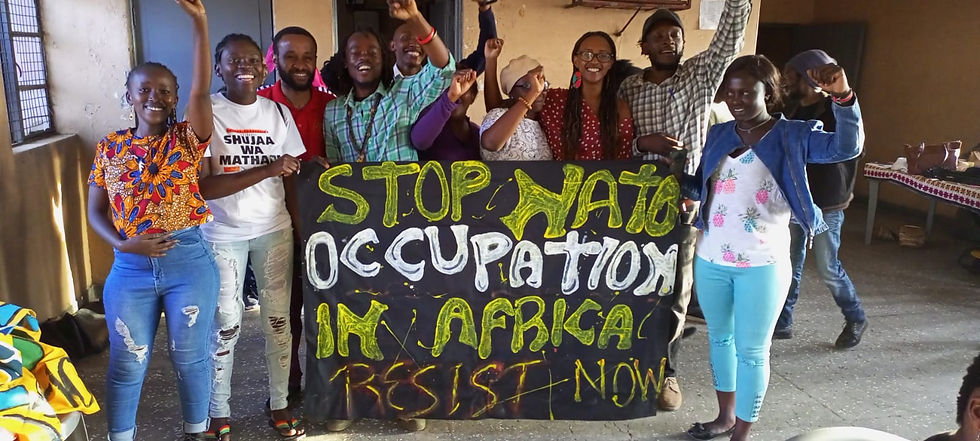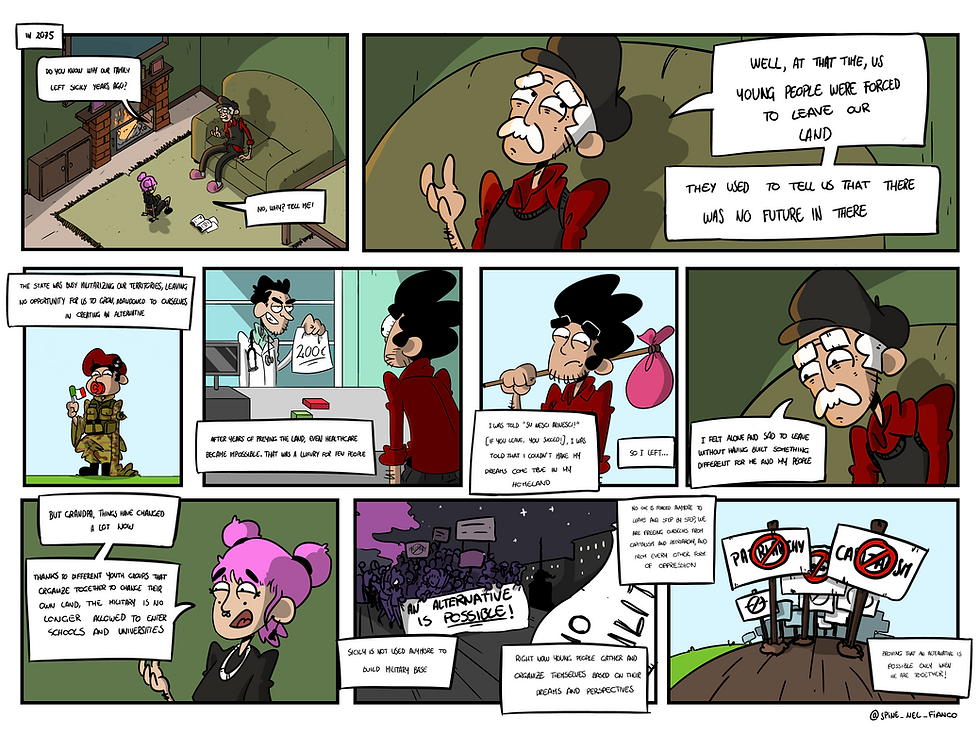Navigating the Path to Global Solidarity - Reflections on the World Youth Conference
- Apr 7, 2024
- 6 min read

By Lewis, Socialist Revolutionary League, Kenya.
In the heart of Paris, a city steeped in history and culture, the World Youth Conference unfolded as a beacon of hope and a platform for change. As I stepped into the vibrant atmosphere of the conference, I was immediately struck by the diversity of voices and perspectives that had gathered to tackle the pressing issues of oppression, exploitation, patriarchy, imperialism and militarism exacerbated by global capitalism.
The World Youth Conference, organised by an international network of organizations under the banner ‘Youth Writing History’, brought together representatives of various youth organizations from all across the world, unified by the common goal of achieving liberation for all of the people of the world.
I attended the conference as a representative of the Revolutionary Socialist League, a Kenyan-based revolutionary youth organization committed to attaining the complete overhaul of the current exploitative capitalist system and its replacement by socialism.
The Revolutionary Socialist League (RSL) fights for the total liberation of the Kenyan people in particular and the African people in general, and all the oppressed and suppressed peoples of the world struggling to smash exploitation in all its forms. The RSL is geared towards the ultimate fulfilment of the aspirations of the people of Kenya, Africa, and the world at large. The RSL recognises the need to come together urgently, for the sake of the success of the International Proletarian Movement, with other working class and revolutionary organizations throughout the world, in forging a global revolutionary alliance. And so, it was our pleasure to participate in the World Youth Conference!
In Kenya, the RSL organizes against the backdrop of a fierce neoliberal onslaught. More and more Kenyans, especially the youth, are finding it increasingly difficult to access food, the most basic human need, as a result of the ever-growing prices of basic commodities. The government of Kenya, in blatant disregard to the plight of the people, has continued to impose heavier taxes on food, fuel and other basic commodities. This is a bid to comply with the directives of the IMF and other global financial institutions. The result, unsurprisingly, is that the overwhelming majority of the population finds itself in a serious state of destitution, worsening an already deplorable situation : Kenya ranks 86 out of 117 countries on the 2019 Global Hunger Index. More than 3.3 million Kenyans, additionally, cannot get enough water to drink.
Within our informal settlements and urban dwellings, the negativities of inequality continue to be felt. According to research by the African Population and Health Research Centre, 80% of slum residents in Kenya suffer food insecurity, which partly explains the high malnutrition rates of close to 50% among children. Slum residents account for more than 60% of the population in Nairobi, Kenya’s capital city. Further, more than 13 million Kenyans suffer from chronic food and nutrition insecurity according to SOFI, a publication of the Food and Agriculture Organization. One quarter of the children in Kenya have stunted growth.
The gap between the richest and the poorest has reached extreme levels in Kenya. Less than 0.1% of the population (8,300 people) own more wealth than the bottom 99.9% (more than 50 million people) according to Oxfam International. The richest 10% of people in Kenya earned on average 23 times more than the poorest 10%.
In the face of this crisis in Kenya, the RSL and I viewed my participation in the World Youth Conference as an opportunity to not only discuss these issues and more in our analysis of the global situation, but also to join other like-minded organizations in forging a unified front against international capitalism. Further, we viewed the convening of the inaugural World Youth Conference as the beginning of a bold step by young people all over the world in taking the daunting responsibility of being in the front line against imperialism, fascism, militarism and oppression in all its forms.
Hosted in the heart of Paris, the conference aimed to dissect and confront the multifaceted challenges posed by the current state of the world. Its overarching mission was to pave the way forward towards a more equitable, just, and sustainable global future. The various thematic workshops held during the conference delved into the liberal way of living, women's liberation, ecology, fascism and militarism, unemployment and inequality, the rights of indigenous people, and the essence of internationalism.
One of the pivotal discussions revolved around the liberal way of living. Delegates engaged in insightful dialogues that questioned the prevailing societal norms and values associated with liberalism, looking into their impact upon the youth. The workshops prompted attendees to critically examine the impact of Western-centric ideologies on the global stage, challenging us to re-imagine a more inclusive and culturally sensitive approach to societal structures.
The question of women's liberation emerged as a powerful and resonant theme. Attendees were confronted with the harsh realities of gender-based oppression, exploitation, and violence that persist globally. The workshops served as a catalyst for passionate conversations on dismantling patriarchal systems and fostering environments where women can thrive in all spheres of life. Participants looked into the role of patriarchy in sustaining capitalism and propagating the exploitation of labour, with the labour of women being exploited doubly. Empowerment and solidarity emerged as key tenets in the pursuit of true gender equality and women’s liberation.

Ecology took centre stage as participants grappled with the urgent need to address environmental degradation and climate change. From discussions on sustainable practices to debates on the responsibilities of industrialized nations, the workshops ignited a collective determination to safeguard the planet for future generations. The conference became a crucible for innovative ideas and concrete actions to mitigate the ecological crisis. Most importantly, comrades identified the root cause of the current climate and ecological crisis, capitalism and its ever-growing hunger for profit, with total disregard to the consequences.
Confronting the spectres of fascism and militarism and their devastating impact on communities worldwide, attendees engaged in thought-provoking conversations on the importance of dismantling authoritarian regimes and promoting peace. They identified fascism and the rise of the far-right as an ever-growing threat within our respective nation-states. Comrades correctly recognised the need to come together speedily, for the sake of all oppressed people of the world, and establishing an international front to combat fascism and the rise of the far-right.
Unemployment and inequality were dissected with a keen eye towards dismantling systemic barriers that perpetuate poverty and social disparities. Attendees grappled with the implications of a global economic system that often benefits the few at the expense of the many. They also recognised that the current economic system is not broken; it is in fact working as it should and that the stark inequality witnessed throughout the world is but a characteristic of capitalism as a mode of production. The workshops recognised the need for an alternative system that prioritizes inclusive economic growth and address the root causes of unemployment and inequality.
The rights of indigenous people emerged as a deeply important topic, enabling participants to look into the destructive effects of the ongoing economic and sociocultural hegemony of imperialism upon the indigenous people of the various places in the world. Representatives from diverse indigenous communities and cultures shared their experiences, shedding light on the challenges faced by indigenous communities around the world. The conference served as a platform to amplify their voices and reinforce the solidarity of all revolutionary organisations in the struggle for the protection of indigenous rights, cultures, and lands.
The spirit of internationalism permeated every facet of the conference, fostering connections between revolutionary organisations from different corners of the globe. Delegates explored the importance of collaboration in addressing global challenges through combining our campaigns and struggles, and fostering a sense of shared responsibility for the well-being of humanity.
As I reflect on my experiences at the World Youth Conference in Paris, the prevailing sentiment is one of optimism and determination. The conference not only shed light on the intricate web of challenges we face but also instilled a sense of collective purpose and a belief that change is not only possible but imperative.
Paris, with its storied history of revolutions and social movements, served as a fitting backdrop for this gathering of young minds determined to shape a better future. The workshops, discussions, and interactions at the conference underscored the power of unity in addressing the complex challenges of our time. The exchange of ideas and the forging of connections laid the foundation for a global movement committed to dismantling oppression, exploitation, patriarchy, imperialism and militarism.
As I carry the lessons and inspiration garnered from the World Youth Conference back into my organization and community in Kenya, I am reminded that the pursuit of a just, free and equitable world is an ongoing journey. The conference was not merely a moment in time but a catalyst for a sustained movement towards global solidarity. The experiences in Paris have left an indelible mark on my understanding of the world and my role in shaping its future. The path forward may be challenging, but with the collective spirit ignited during the conference, the journey towards a more just and compassionate world free of exploitation and oppression is both achievable and imperative.
Truly, Capitalism is not inevitable; another world is possible!




Comments